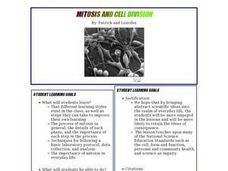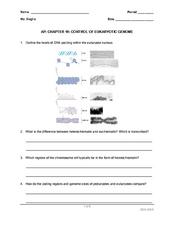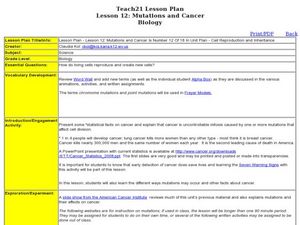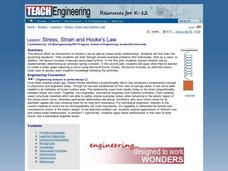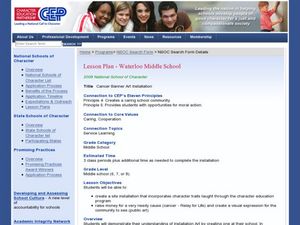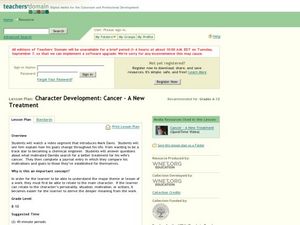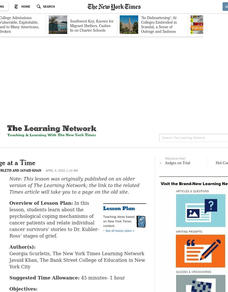Curated OER
Lesson 2: Helping
Students role-play taking care of each other. In this cancer lesson, students examine how to help someone who is sick. Students discover that cancer is not contagious. Working in small groups, students role-play how to take care of each...
Curated OER
Harvest the Facts
Learners discover heath problems caused by tobacco. In this human health lesson plan, students identify the many diseases tobacco use causes and how to prevent such diseases. Learners investigate the organs in the human body directly...
Curated OER
Using Ionising Radiation in Medicine
This is an information-intense presentation for any science class you might be teaching that will study ionising radiation. The material is specific to cancer diagnosis and treatment, and one of the forty-two slides also touches on using...
Curated OER
Cancer and the Cell Cycle - Biology Teaching Thesis
Identify the different stages of mitosis and what occurs in each stage with a straightforward biology lesson. Young scientists identify the importance of the cell cycle control in maintaining homeostasis, and then match the correct stage...
Curated OER
Mitosis and Cancer - Biology Teaching Thesis
Observe onion root cells undergoing mitosis underneath a light microscope and determine the phase of mitosis the cells are in. High schoolers draw a sketch of the mitotic cells, explore why cells undergo mitosis and learn how...
Curated OER
Mitosis and Cell Division
Students discover the processes that occur during mitosis and what makes each phase different and distinct from the others as well as how each contribute to the overall process of mitosis by looking at onion root tips under a microscope.
Curated OER
AP: Chapter 19: Control of Eukaryotic Genome
When your AP biology class is studying DNA and genomes, this worksheet will provide a detailed review. On the first page are diagrams and matching SEM (scanning electron microscope) images of different levels of DNA packing to be...
Curated OER
Mutations and Cancer
Students study how cancer cells mutate and affect cell division. In this investigative lesson students view a PowerPoint presentation learn the seven warning signs of cancer.
Curated OER
Student Cancer Journals -- Personal Reflections and Research on Life and Death Issues
Concepts learned in the study of mitosisand biochemistry help when making life or death decisions. Compile a notebook or portfolio of work related to the project can make the research more organized and relevant.
Curated OER
Stress, Strain and Hooke's Law
Students study Hooke's Law and stress-strain relationships. In this spring lesson students create a strain graph in Microsoft Excel.
Curated OER
Detecting Breast Cancer
Students develop a painless means for identifying cancerous tumors. In this imaging lesson students list the information that may be needed to answer the problem.
Curated OER
So, the Test Is Positive
Young scholars participate in a probability-based exercise. They consider the implications of testing positive for a cancer when the test is less than 100% accurate and analyze their results.
Curated OER
Cancer Banner Art Installation
Students complete a service learning project to raise money for Relay for Life. In this service learning lesson, students discuss installation art and watch a video about Pepon Osorio. Students review articles about service projects and...
Curated OER
Cancer
Students study cancer and possible preventative measures. In this cancer lesson students study the claims on food labels and ways to lower your risk of cancer.
Curated OER
Cancer Research
Students participate in a class demonstration to see how many Americans are affected by cancer in their lifetime. In this public health lesson, students are placed in situations that allow them to experience how relevant cancer research...
Curated OER
Breaking News English: Cancer
In this cancer worksheet, students read the article, answer true and false questions, complete synonym matching, complete phrase matching, complete a gap fill, answer short answer questions, answer discussion questions, write, and more...
Curated OER
Character Development: Cancer - A New Treatment
Students explore the concept of character development. In this character development lesson, students watch a video segment regarding a family's struggle with cancer. Students examine the personality, situation, motivation, and actions...
Curated OER
Control of the Cell Cycle
In this cell cycle worksheet, students review how enzymes control the cell cycle and what happens when the cell cycle becomes uncontrolled. This worksheet has 7 short answer questions.
Curated OER
Innovations in Elder Care
Students describe the symptoms and suspected causes of Alzheimer's disease or cancer. They describe current research projects seeking to learn more about or find treatments for either Alzheimer's disease or cancer. Students compare...
Curated OER
Protect the Skin You're in
Students explore the importance of sun safety in relationship to skin cancer prevention. They test the effectiveness of various sunscreens and administer and analyze a simple survey to their peers. In addition, they implement a public...
Curated OER
The Genetic Diagnosis of Cancer: The Questions Continue to Multiply
High schoolers review the basic concepts of genetics, such as Mendelian inheritance and pedigree construction and analysis. They use an activity that uses recent findings in cancer genetics to present. Students use a pedigree in a...
Curated OER
Animal Organs and the Study of Reproduction, Embryology and Cancer
Students examine organs from dogs and cats to study reproduction, embryology, and the identification of cancer. They record their observations at both the gross and microscopic levels. They present their information to the class.
Curated OER
Cancer Causes
Learners explore why people get cancer. They explore human cells by taking a close examine their own. take a small sample of the epithelial cells that line the inside of their mouth. They glimpse how scientists investigate inside cells.
Curated OER
One Stage at a Time
Students explore the psychological coping mechanisms of cancer patients and relate individual cancer survivors' stories to Dr. Kubler-Ross' stages of grief. They use first-person accounts, discussion and journals to explore these concepts.







